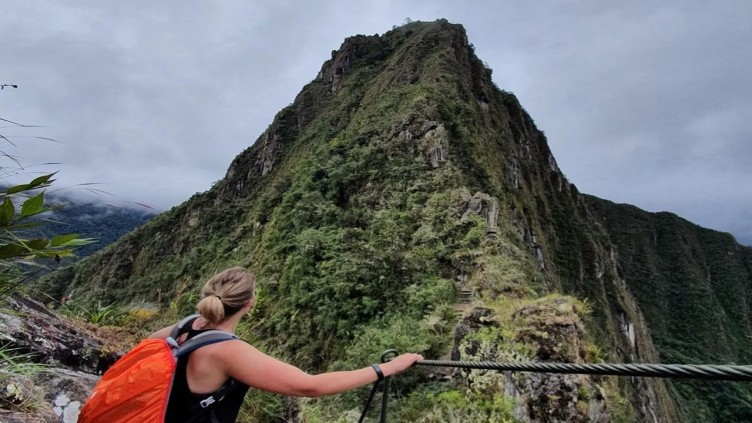Breaking Free: A Journey of Revival, Resilience, and Rediscovery in 2023
Last year, for the first time since I was 16, I stopped working. On the 25th of February, I handed in my badge and my laptop and walked away from the office for the last time that year. Just before Christmas 2021, I had tentatively asked my boss if I could take a sabbatical (something that the business offers to employees after so many years of service), so I could journey around the world for 9 months and return in 2023. And they agreed. My partner also wanted to travel, except his company didn’t offer sabbaticals, or at least not for the length of time that we wanted. Whilst I knew my role was waiting, he would be dealing with unemployment and uncertainty on our return to the UK.
What Covid taught us
It baffles me in the 21st century that so few companies offer sabbaticals or any kind of extended time off for oneself, to retrain, to rethink, to reassess. Covid (for all its evils) taught us so much about the importance of having time to stop. So many workers were burning out, glued to their screens, working longer hours from home because they couldn’t escape the office as their living room became their new work desk. For many, this experience has led to a renewed vision of what work means to them, with 3 in 5 employees planning to change their career*
Interestingly, the pandemic also taught us that the “survival of the fittest” narrative was outdated. The virus was proving that it could take anyone, no matter how physically fit they seemed, no matter how mentally resilient. And yet, many companies still look to this Darwinian notion to seek out their best employees. Who can handle the most stress? Who can carry the biggest burdens? Frankly…it’s all B.S. Everyone needs a break. To get the most out of employees and to keep teams and work forces motivated, confident and forward thinking, we need to be done with the survival narrative once and for all and start talking more about revival.
Revival in this context is about improving the strength and condition of our workforce. It’s about reigniting the spirit and soul of our employees to come back fighting fitter, not because they survived the horrors of burn out or depression, but because they were given the opportunity to recover and grow. For me, the pandemic had really taken a toll on my mental health as I was fully embroiled in Covid19 marketing communications for the city I live in. I can whole heartedly say that my sabbatical saved me. Having that time off to rethink and experience the world again without the stresses and pressures of work allowed me to come back with a reinvigorated desire to work harder and grow professionally. It has also strengthened and extended an array of personal skills I will carry with me for life, skills that are highly desired in any employee and work force.
Problem solving
Several times during our travels, we found ourselves stranded in a remote location, cut off from public transport due to cancelled trains or flights. Unbeknownst to me, I was getting a crash course in UK commuter life on my return in the new year.
One of those experiences was in a town called Aguas Calientes in Peru, the main tourist hub for those who wish to visit Machu Picchu and the only way in and out is via the train network. We had just recovered from an adrenaline fuelled day of climbing Huayna Picchu (the mountain overlooking the more famous Machu Picchu and known for the ‘Stairs of Death’ travellers must conquer to reach the top) when I received an email from our train company. They casually informed us that due to strikes, our train had been cancelled with all future train schedules coming to a grinding halt until further notice.
These strikes are common, and tourists have been known in the past to walk the lengthy route along the train tracks towards a local powerplant which offered bus transportation, only to be fined or arrested for trespassing on the lines. We decided, as we stood in the station surrounded by other panicked travellers that we wouldn’t take the illegal route home, but our limited Spanish meant negotiating with the train companies to arrange alternative transport was also not an option.
We solved this problem with teamwork. We didn’t speak Spanish, but another stranded passenger did and whilst everyone else was in hysteria, sinking into their phones searching for an answer, my partner and I, accompanied by this Mexican/American stranger, negotiated with a rival train company to get us the last 3 tickets to a nearby town that night. From there, our now new friend promised to help us get home via taxi, with his impeccable Mexican negotiation skills. And what an incredible night we had! Completely unplanned, unexpected, sublime chaos of bartering with 8 taxi drivers, stopping in the middle of nowhere while our driver argued with his Peruvian mother on the phone whilst also being chased by a street dog and keeping him entertained so he didn’t fall asleep at the wheel.
With experiences like this one, I realised that I could, with the help of others, solve even the most unexpected problems and challenges, no matter how big or small, no matter where I was in the world, no matter what street dogs may come our way.
Resilience
It was also moments like this one which made me realise just how resilient I could be. I had lived a sheltered life before travelling and whilst that’s meant I hadn’t needed to be particularly tough; it has also meant that I have never taken too many risks or pushed myself into new challenges because I wasn’t confident of how I would react if I failed.
Travelling isn’t always beautiful beaches, serene nature, peace, and wonderment the way influencers would like you to believe. Sometimes it’s scary and uncomfortable. Sometimes it’s having your bag stolen on an overnight bus. Sometimes it’s having to sleep on an airport floor because your flight was delayed by 12 hours and you can’t afford the astronomical prices of an airport hotel room.
This was certainly the case when a random man walked towards me across the streets of Santiago and shoved his hand in my pocket to steal my phone. Lucky for me, I had learnt to conceal my valuables (or as they say in South America, I had learnt not to “flash the papaya”). It did however, shock and upset me and made me untrusting for a while, looking at every stranger as a possible thief. This prepped me for when my bag was stolen a month later. I realised that worse things could happen and that I would recover from my loss just as I recovered from my incident with the Chilean thief.
Many of these unwanted experiences taught me just how strong emotionally I could be during that time, away from the comforts and safety of my home and my family. It taught me to expect the unexpected and to be brave in a way that I wouldn’t necessarily have learnt in my UK bubble. I know now that even when life feels difficult, unfair, and unrelenting, that things will get better. “This too shall pass”. I understood that I could handle more challenges and setbacks than I might have previously thought possible and I’m more confident to take risks, aim higher and strive for more. Travel insurance is also important.
Facing fears and expectations
I put facing fears and expectations in the same category, because many a time, I was fearful of doing something because I had an expectation about what the experience would be like, usually that it would be ‘negative’ or ‘scary’. We very easily create scenarios or narratives in our mind that we think so deeply about and give so much colour to, that in the end, we forget that it’s not a truth, just a picture we drew. It wasn’t until I stopped working and went on leave that I realised just how often I did this. I would constantly crystal ball conversations and meetings at work often leading to anxiety.
For the first 4 months of travelling, I read blogs and heard stories from people and made up ‘truths’ in my head about what to expect from a new place. The obvious one being Colombia. If you go onto the UK government website, the recommendation is to travel only if absolutely necessary. There are tonnes of horror stories online about robbery, stabbings, drug cartels, murder…the list goes on. And the reality is, Colombia is a beautiful and welcoming country and I would recommend it to anyone. The people are some of the friendliest I have ever met; the music and the street art is mesmerising, and the landscape is breath-taking. How different our trip would have been if I had listened to those fears and accepted those assumptions as reality.
Facing a fear doesn’t have to be as grand as giving up your job and your house and wandering the world (which was my biggest fear before we left). Facing a fear can be as simple as applying for a more senior position or speaking up in a meeting to voice your opinion. If we could all predict the future, we would win the lottery, and probably end up extremely unhappy! I now find it to be an ongoing internal joke in my mind as to how often I can prove myself wrong.
Productivity
It appears to me that a lot of companies don’t want to offer paid or unpaid extended leave to employees because they’re worried they’ll come back and want to leave permanently. Temporary leave can create room for others to step up, trial a new role and responsibilities and can be a great opportunity to motivate a team.It allows movement, fresh ideas, new ways of thinking, a renewed sense of purpose and confidence with the ability to understand what skills are required for the job.
It also means that you’re not creating a stagnant and burned-out workforce, giving less than their all as they’ve lost their drive and enjoyment. Giving employees an opportunity to take a break, to reassess and experience alternative lifestyles or reskill means that you’ll either gain back a more fulfilled, driven, productive employee or you’ll say goodbye to someone who wasn’t fully committed anyway and was no longer mentally able to give you their 100%.
I fall into the first category. Travelling for me, and having that time away, has allowed space in my brain to gain greater insight into what makes me tick, figure out what I enjoy doing beyond work, understanding what I want my life to look like post backpacking. From a personal perspective I fell in love with scuba diving, took up my open water certificate and visited some incredible diving spots. It’s a hobby I will now continue to pursue for life. From a professional perspective I realised that I had let my development slip in certain areas, I was majorly burnt out from the pandemic, and I didn’t have the capacity to focus on my long-term career prospects. Now I am looking to upskill and develop in new areas to improve my overall output and hopefully look to coach others to do the same.
My partner is respected and great at his job, working in an industry that was crying out for more workers, so it wasn’t long before he found a new role. But what a shame that the company he previously worked for has now missed out on a renewed, energised, forward thinking colleague.
In summary…
Surviving is important, but thriving is preferred and for many of us, we need an opportunity to revive to do that. Much like Bilbo Baggins in his Hobbit journeys, returning to his shire and being welcomed back by his loving (albeit greedy) neighbours…Every hero needs a rest before they embark on their next journey.




